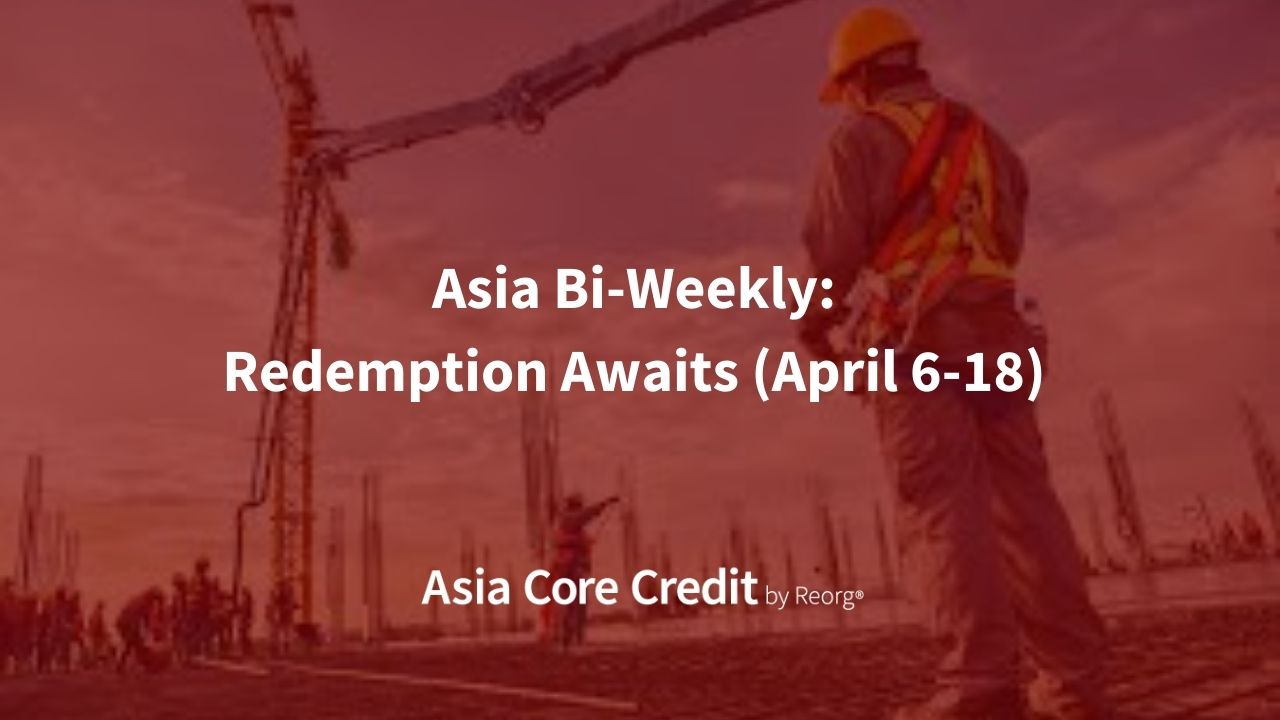Asia Bi-Weekly: Redemption Awaits (April 6-18)
Written by Stephen Aldred, Managing Director, Asia Core Credit by Reorg.
Logan Group has substantial offshore assets in Hong Kong and Singapore of at least $1.2 billion which could offer attractive credit enhancements for offshore creditors in an expected liability management exercise.
This is among the key findings of Reorg’s April 13 extensive TEAR SHEET on Shenzhen headquartered Chinese real estate developer Logan. Full details of the assets and potential enhancements they could offer to both onshore and offshore creditors can be found in the tear sheet, but similar to Shimao Group, Logan’s assets that could be disposed of may include larger scale hospitality and investment properties that are income producing, or incomplete onshore developments being co-developed with another developer with no liquidity issues. Outside of Mainland China, Logan has significant projects in Hong Kong and Singapore amounting to at least $1.2 billion at the end of 2020, according to Reorg’s estimate.
In the event a prospective liability management exercise (LME) is carried out, offshore creditors may look to Logan’s investments in its offshore projects by pledging its respective shareholder’s loan receivables and/or equity as possible credit enhancements, to the extent they remain unencumbered, our analysts note.
An LME for Logan is to be expected in the next few months, for reasons our tear sheet also outlines, including the potential cross default to public offshore notes through an unpaid guarantee demand on $200 million private placement notes.
If Logan’s assets were pledged as credit enhancements in an LME, it could go some way to redeeming the company in the eyes of creditors.
As I’ve previously argued, Logan is among a number of Chinese real estate developers that have contributed to an erosion of trust in sources of information that the market previously used to gauge the truth in making investment decisions.
Logan’s particular sin has been its repeated denials of even having private placement notes. At the risk of belaboring a point, Reorg’s reporting had shone a light on Logan’s private debt as far back as June 2021. As recently as mid-January, we reported that the company was still in denial of the existence of such debt, with senior management telling investors on a due diligence trip that they were “investigating” whether widely rumored notes were somehow related to the company’s subsidiaries.
The February revelation of about $1 billion in previously undisclosed guaranteed debt will have given investors clear guidance on Logan’s previous routine denials. The question for investors is perhaps less about how a company can suddenly discover $1 billion in undisclosed debt, and more about the motivation behind a pattern of denial and revelation.
Motivation becomes a consideration when you approach a potential LME for Logan, along with the general outlook for near-term recovery of the Chinese real estate sector.
You might be accused of being a hopeless optimist were you to believe that either the Chinese real estate sector or Logan Group were going to turn their fortunes around entirely in the next 18 months. However, 18 months happens to be the average maturity extension of notes subject to an LME in the current wave of these transactions, based on Reorg’s comparative analysis of the various schemes.
The fact that proposed exchange notes often include a 75% money term amendment threshold – a significant decrease from the usual unanimous consent threshold contained in New York governed notes – lends credence to the prevailing sense that LMEs currently ongoing are eroding creditor protections afforded under New York law governed notes.
This simply sets the scene for a future potential contractual cram-in through the lowered money-term amendment thresholds instead of needing to use a scheme of arrangement, as our analysis also notes.
Logan may well be inclined to add erosion of creditor protections to its prior erosion of creditor trust through non-disclosure of off-balance-sheet guaranteed liabilities.
Organized creditors may wish to offset that by seeking enhancements such as asset sale redemption mechanisms for any proposed exchange notes, as has been recently seen with Jingrui Holdings and Zhenro, or a personal guarantee from chairman Kei Hoi Pang – as was seen with Guorui Properties Limited’s proposed exchange offer, where a personal guarantee from controlling shareholders was offered.
Logan is unlikely to offer credit enhancements out of the goodness of its heart. But organized offshore creditors might, through attaching such enhancements, retain value from offshore assets, avoiding value flowing to other stakeholders, and offsetting erosion.
Logan’s redemption under such circumstances might be a little forced. But such recoveries do need guidance.
This article refers to liability management exercises (LMEs) undertaken by Chinese real estate developers.
